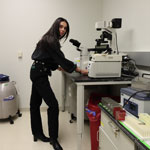Kidney Disease Pharmacology: Drugs, Biologics, Delivery & Devices
The Joy laboratory specializes in research of drugs, biologics, delivery approaches, and devices in kidney disease. We use a variety of in vitro and in vivo methods to best inform about the pharmacology of drugs in diseases of the kidney. Our understanding of pharmacology in this special population comprised of both adults and pediatrics, has enabled the research and development of novel drugs and devices. This is important given that the rate of new drug and device approvals for kidney disease indications is lagging as compared to other therapeutic areas. We also have experience in conducting in vitro and in vivo studies to assess nephrotoxicity and its prevention.
Melanie Joy PharmD, PhD
Professor
Professor, Director of Innovation and Commercialization, Director of Entrepreneurship Education, SPARK/REACH Program
Phone:303-724-7416
(1/4)
(2/4)
(3/4)
(4/4)
| Scott Tilden, PhD, PostDoc I am a Colorado native, avid skier, musician, and run my own indoor farming business with my brother. I completed my undergraduate at CU-Boulder and my PhD in Toxicology here at CU-Anschutz. I have over a decade of experience in conducting cutting-edge research, publishing in peer-reviewed journals, and presenting at international scientific conferences in the fields of immuno-oncology, pharmaceutical sciences, and toxicology. I have also secured multiple patents, honors, and prizes for my innovative and impactful work. I am currently working as a postdoctoral fellow with Dr. Melanie Joy to investigate renal toxicity caused by immune checkpoint inhibitors and to help develop a novel kidney-targeted drug delivery method for patients suffering from lupus nephritis. My goal is to significantly contribute to the scientific community while working to improve patient therapies and outcomes. Additionally, I hope to gain the necessary experience to transitioning into medical affairs and scientific communication, where I can leverage my expertise to help bridge the gap between basic research, the clinic, and the public. |  |
| Avisek Ghimire, BS, MS, InstructorAvisek completed his B.S. degree in pharmacy from Kathmandu University, Nepal. His interest and exposure to drug therapy and pharmacokinetics during the undergraduate studies led him to a MS degree in pharmaceutical sciences (clinical pharmacokinetics and pharmacodynamics track) at the University of Colorado. Avisek completed research on the influence of chronic kidney disease (CKD) on CYP2B6 function through assessment of bupropion pharmacokinetics in vitamin D deficient patients as his MS thesis. He is highly engaged with pharmacokinetic studies and analysis of drug data, and conducting pharmacokinetic pharmacodynamic modeling and simulations using various platforms including Certara Phoenix and PK-Sim/MoBi. Currently, Avisek is conducting a population pharmacokinetic modeling of vitamin D and its metabolites in patients with vitamin D insufficiency. He also advises MS and PhD students on their thesis projects on pharmacokinetic and pharmacodynamic modeling. During his spare time he likes to hike, play soccer, and hang out at coffee shops. |  |
| Lauren E. Thompson, BS: PhD Student in Pharmaceutical Sciences Lauren completed her BS degree in Biochemistry with a minor in Mathematics from Denison University in Ohio. Lauren’s research focuses on risk factors of cisplatin-induced acute kidney injury (AKI) in cancer patients and potential mitigation strategies. Her work includes investigating nephroprotectant compounds in a mouse cancer model of cisplatin-induced acute kidney injury. She is additionally leading a clinical trial with the goals of elucidating pharmacokinetic and pharmacogenetic determinants that govern renal exposure to cisplatin, as well as the impact of 5-hydroxytryptamine (5-HT3) antagonists, a class of antiemetic drugs. A better understanding of the key processes and pathways involved in renal cisplatin exposure will lead to therapy adjustments to decrease renal exposure and toxicity, while maintaining efficacy. | .jpg?sfvrsn=89f7d3bb_1) |
| Sarah Asby, BS: PhD Student in Pharmaceutical Sciences Sarah Asby graduated from the University of Virginia in 2018 with a BS in Engineering Science-Nanomedicine Engineering and minors in Material Science Engineering and Biomedical Engineering. After graduation, Sarah worked in the Pilon-Thomas Lab in the Immunology Department at Moffitt Cancer Center as a research associate studying translational immunotherapies and mechanisms in TIL therapy of cancer. Sarah’s research focuses on immune checkpoint inhibitor (ICI) induced nephrotoxicity in cancer patients. Her work specifically aims to investigate mechanisms and develop physiologically based pharmacokinetic (PBPK) models of ICI-mediated kidney injury in both a Humanized Immune System (HIS) mouse model as well as cancer patients enrolled in the clinical study. This work also aims to identify and evaluate biomarkers of kidney injury within HIS mice and patients receiving ICI treatment, as well as investigate potential mitigation strategies and treatments of injury. These studies aim to provide a better understanding of ICI-mediated nephrotoxicity to ultimately aid in prevention, earlier diagnoses of injury, as well as offer insight regarding potential therapeutic strategies. |  |
| Sydney Broyles, BS: MS Student in Pharmaceutical Sciences Broyles is originally from central Ohio. She graduated from the University of South Florida in 2022 with a BS in Biomedical Sciences. Currently she is enrolled in the Pharmaceutical Sciences master’s program here at Anschutz with a concentration in pharmacokinetics/pharmacodynamics. Her research focuses on population pharmacokinetic modeling and PK/PD predictions of rituximab (RTX) in membranous nephropathy patients. This will hopefully lead to more precise dosing and patient specific characteristics being taken into account. |  |
(1/14)
(2/14)
(3/14)
(4/14)
(5/14)
(6/14)
(7/14)
(8/14)
(9/14)
(10/14)
(11/14)
(12/14)
(13/14)
(14/14)
